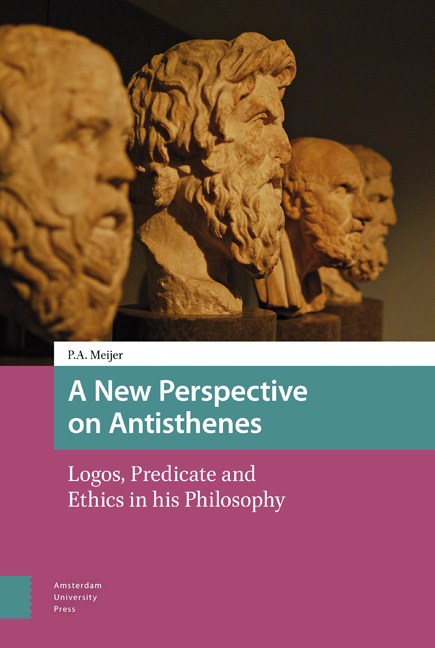Book contents
- Frontmatter
- Dedication
- Contents
- Preface
- Abbreviations
- Primary Sources – Editions Used
- Introduction
- Part I LOGOS AND PREDICATE
- Part II ANTISTHENES’ VIEWS ON THEOLOGY: HIS THEORETICAL APPROACH TO THE STUDY OF HOMER
- Part III ANTISTHENEAN ETHICS
- Epilogue: Antisthenes, an Assessment
- Appendix II The Speeches of Ajax and Odysseus
- Bibliography
- Concordance Giannantoni (SSR) – Caizzi (D.C.)
- Index
Chapter I - Ethics and Myth
Published online by Cambridge University Press: 24 December 2020
- Frontmatter
- Dedication
- Contents
- Preface
- Abbreviations
- Primary Sources – Editions Used
- Introduction
- Part I LOGOS AND PREDICATE
- Part II ANTISTHENES’ VIEWS ON THEOLOGY: HIS THEORETICAL APPROACH TO THE STUDY OF HOMER
- Part III ANTISTHENEAN ETHICS
- Epilogue: Antisthenes, an Assessment
- Appendix II The Speeches of Ajax and Odysseus
- Bibliography
- Concordance Giannantoni (SSR) – Caizzi (D.C.)
- Index
Summary
Introduction: moral strength
As far as we can see in the debris of his works, Antisthenes’ ethical doctrines have no systematic character. There are a limited number of titles on Diogenes Laertius’ list that promise ethical discussions. But one cannot always trust one's eyes – even in works with a mythological title moral issues can come extensively to the fore. Nor are these titles united by a leading theme; instead there are multiple themes. We have already offered some remarks on his theory of pleasure (if it deserves to be called a theory), and some discussion of his tendency to mitigate strong pronouncements once they have done their work by drawing attention.
The evidence concerning moral strength is found in a number of fragments. We have two core concepts in a fragment which states that ponos (‘effort’, ‘exertion’) is a good (ὅτι ὁ πόνος ἀγαθόν). One could suppose that exertion, even strain, might be a bad phenomenon, but Antisthenes, eager to establish that ponos is a good thing, illustrates this by pointing to Heracles’ efforts in accomplishing his works (as a Greek example), and to his idol Cyrus and his efforts (as a foreign example). We have already noted that pleasure after effort is good, or in any case acceptable, whereas there is also the strong utterance that Antisthenes would rather be mad than move a finger for pleasure. There is furthermore a fragment which compares efforts to dogs because they also bite the unfamiliar; the intention here seems to be that if one is not accustomed to efforts they cause pain, so one had better get used to ponos. This is in line with the remark that to exercise virtue all one needs is the strength of a man like Socrates, one of the few references to the name ‘Socrates’ in what remains of Antisthenes’ works. It is an important reference because Socrates was an ethical model, an ideal for many including Antisthenes. Socrates was reportedly immune to influences from outside; his long vigil at Delium was proverbial. In Xenophon's Symposium there is a portrait of Antisthenes’ conducting a conversation in which ethical issues play an important role.
- Type
- Chapter
- Information
- A New Perspective on AntisthenesLogos, Predicate and Ethics in his Philosophy, pp. 107 - 113Publisher: Amsterdam University PressPrint publication year: 2017



